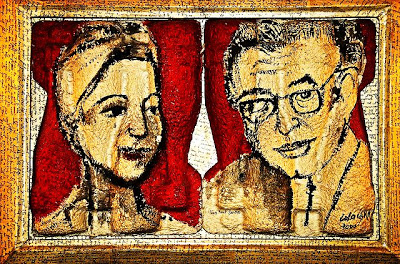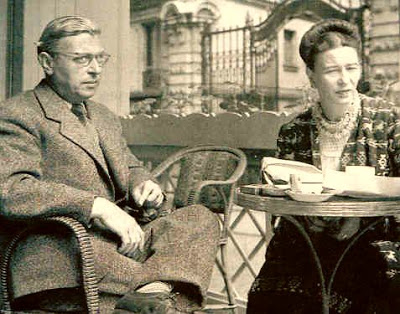Philosophy


The Writer's Almanac...
It's the birthday of the novelist and philosopher Simone de Beauvoir, born in Paris, France (1908). She entered the Sorbonne, and it was there that she met another philosophy student, Jean-Paul Sartre. He was five feet tall, had lost his sight in one eye, wore baggy clothes, and seemed to have no interest in hygiene. But he loved to talk, and he was both funny and brilliant. Beauvoir later said, "It was the first time in my life that I felt intellectually inferior to anyone else."
Sartre was equally impressed by Beauvoir's intellect, especially when she finished her philosophy degree in one year, after it had taken Sartre three years to finish his own. She was the youngest person to receive the degree in French history. They fell in love, but instead of getting married, they decided to form a pact. They would both have affairs with other people, but they would tell each other everything. That basic arrangement of their relationship would last for the rest of their lives.
They didn't even live together, but every evening they would meet in a café and show each other what they were working on. They each edited the other's work, and they gave each other ideas, and together they helped formulate the school of philosophy known as existentialism, which was the idea that human beings should consider themselves completely free to define their own existence, without regard to religion, culture, or society.
Sartre wrote his book Being and Nothingness (1943) about the new philosophy, and Beauvoir followed with a book of ethics based on the same ideas called The Ethics of Ambiguity (1947). But one of her most famous books was inspired by an offhand comment Sartre made one day. They were talking about the differences in the ways men and women were treated, and Beauvoir claimed that she'd never been adversely affected by this treatment. Sartre said, "All the same, you weren't brought up the same way a boy would have been; you should look into it further."
So Beauvoir did look into it. She spent weeks at the National Library in Paris researching the way women had been treated throughout history. The result was her book The Second Sex (1949), in which she wrote, "One is not born a woman, one becomes one." It was one of the first comprehensive arguments that the difference between the sexes was the result of culture, not nature, and it helped found the modern feminist movement.
Beauvoir went on to write many more books, including several volumes of autobiography, such as Memoirs of a Dutiful Daughter (1958), about her childhood, and The Prime of Life (1960), which tells the story of her relationship with Sartre and the years they spent together during World War II.
Simone de Beauvoir said, "The writer of originality, unless dead, is always shocking, scandalous; novelty disturbs and repels."
Simone de Beauvoir [Wikipedia]
- Simone De Beauvoir & Judith Butler On Gender
Though Plato's thoughts on gender equality?at least as expressed in The Republic?were somewhat ahead of his time (though that doesn't say much, considering the misogyny of ancient Greece), the legacy of his theory of eternal essences has been...
- Lucy Lawless [xena] Reads Sartre's "no Exit"
Uh, okay, this is different. From PEL [Partially Examined Life]... Mark Linsenmayer and Wes Alwan are joined by real actresses Lucy Lawless (Xena, Battlestar Galactica, Parks & Recreation, etc.) and Jaime Murray (Defiance, Dexter, Warehouse 13,...
- Birthday Of "bad Boy Of Being"...jean-paul Sartre
The Writer's Almanac... It's the birthday of philosopher and writer Jean-Paul Sartre...born in Paris (1905). This giant of existential thought was also a well-known prankster during his days at the École Normale. He and a friend dropped...
- "no Exit" Poll
In Jean-Paul Sartre's "No Exit" is Hell a place or other people? People...3 Place...0 Existentialism, as a philosophical movement, is most dead now but many of its features including human interaction ideas are still applicable. No Exit [Wikipedia]...
- Here'ssssssssssssssssssss...sartre!
Jean-Paul Sartre and Simone de Beauvoir in Brasil in 1960. Ghosts from the past: Phenomenology, Sartre, Camus. Is the author suggesting an association between "thinking" and "ugliness"? Some "tongue in cheek" thoughts. "The Phenomenology of Ugly" by...
Philosophy
Simone de Beauvoir and Jean-Paul Sartre...an unconventional relationship


The Writer's Almanac...
It's the birthday of the novelist and philosopher Simone de Beauvoir, born in Paris, France (1908). She entered the Sorbonne, and it was there that she met another philosophy student, Jean-Paul Sartre. He was five feet tall, had lost his sight in one eye, wore baggy clothes, and seemed to have no interest in hygiene. But he loved to talk, and he was both funny and brilliant. Beauvoir later said, "It was the first time in my life that I felt intellectually inferior to anyone else."
Sartre was equally impressed by Beauvoir's intellect, especially when she finished her philosophy degree in one year, after it had taken Sartre three years to finish his own. She was the youngest person to receive the degree in French history. They fell in love, but instead of getting married, they decided to form a pact. They would both have affairs with other people, but they would tell each other everything. That basic arrangement of their relationship would last for the rest of their lives.
They didn't even live together, but every evening they would meet in a café and show each other what they were working on. They each edited the other's work, and they gave each other ideas, and together they helped formulate the school of philosophy known as existentialism, which was the idea that human beings should consider themselves completely free to define their own existence, without regard to religion, culture, or society.
Sartre wrote his book Being and Nothingness (1943) about the new philosophy, and Beauvoir followed with a book of ethics based on the same ideas called The Ethics of Ambiguity (1947). But one of her most famous books was inspired by an offhand comment Sartre made one day. They were talking about the differences in the ways men and women were treated, and Beauvoir claimed that she'd never been adversely affected by this treatment. Sartre said, "All the same, you weren't brought up the same way a boy would have been; you should look into it further."
So Beauvoir did look into it. She spent weeks at the National Library in Paris researching the way women had been treated throughout history. The result was her book The Second Sex (1949), in which she wrote, "One is not born a woman, one becomes one." It was one of the first comprehensive arguments that the difference between the sexes was the result of culture, not nature, and it helped found the modern feminist movement.
Beauvoir went on to write many more books, including several volumes of autobiography, such as Memoirs of a Dutiful Daughter (1958), about her childhood, and The Prime of Life (1960), which tells the story of her relationship with Sartre and the years they spent together during World War II.
Simone de Beauvoir said, "The writer of originality, unless dead, is always shocking, scandalous; novelty disturbs and repels."
Simone de Beauvoir [Wikipedia]
- Simone De Beauvoir & Judith Butler On Gender
Though Plato's thoughts on gender equality?at least as expressed in The Republic?were somewhat ahead of his time (though that doesn't say much, considering the misogyny of ancient Greece), the legacy of his theory of eternal essences has been...
- Lucy Lawless [xena] Reads Sartre's "no Exit"
Uh, okay, this is different. From PEL [Partially Examined Life]... Mark Linsenmayer and Wes Alwan are joined by real actresses Lucy Lawless (Xena, Battlestar Galactica, Parks & Recreation, etc.) and Jaime Murray (Defiance, Dexter, Warehouse 13,...
- Birthday Of "bad Boy Of Being"...jean-paul Sartre
The Writer's Almanac... It's the birthday of philosopher and writer Jean-Paul Sartre...born in Paris (1905). This giant of existential thought was also a well-known prankster during his days at the École Normale. He and a friend dropped...
- "no Exit" Poll
In Jean-Paul Sartre's "No Exit" is Hell a place or other people? People...3 Place...0 Existentialism, as a philosophical movement, is most dead now but many of its features including human interaction ideas are still applicable. No Exit [Wikipedia]...
- Here'ssssssssssssssssssss...sartre!
Jean-Paul Sartre and Simone de Beauvoir in Brasil in 1960. Ghosts from the past: Phenomenology, Sartre, Camus. Is the author suggesting an association between "thinking" and "ugliness"? Some "tongue in cheek" thoughts. "The Phenomenology of Ugly" by...
